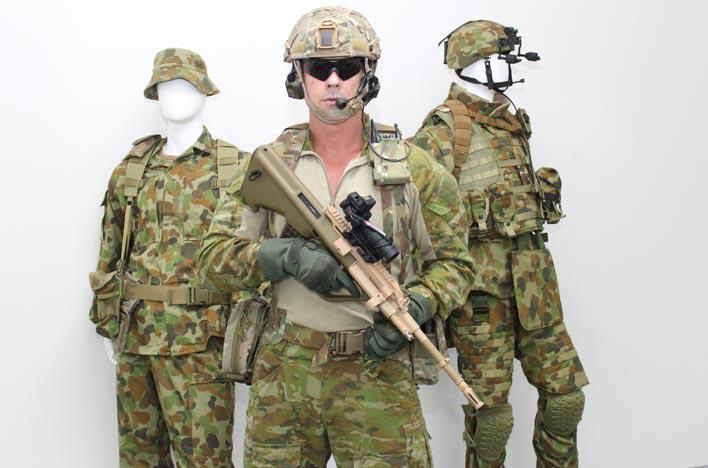
Despite the lack of fanfare, a 22-year program to modernise the ADF’s combat soldier has transformed this most vital of land force capabilities into one that is truly world-leading.
Government has both directed and bankrolled this transformation over 20 years. Labor’s 1994 Defence White Paper committed to ensuring combat soldiers ‘continue to be equipped to meet emerging challenges.’ Similar White Paper direction was expressed in 2000, 2009 and 2013. In the 2016 version, government emphasised that combat soldiers are ‘at the heart of land force capability’ and committed funds for ‘continuously improving’ this critical platform.
If we were to rewind to the mid-1990s, the ADF’s combat soldier was characterised by limited lethality, almost non-existent protection, rudimentary mobility, and very limited situational awareness and endurance. Yet, inspired by the government’s clear policy and funding commitment, visionaries of the time devised a plan for the continuous modernisation of these attributes.
Fast-forward to today and the ADF’s combat soldier is state-of-the-art. Soldiers are now better armed than potential adversaries. They employ enhanced surveillance and communications systems to enable them to identify, decide and act faster in battle. They are endowed with scalable equipment carriage systems, combat uniforms and body armour; all of which can be configured for an array of operational contingencies and environments. Notably, combat soldier modernisation efforts haven’t solely focused on major platform acquisitions. Indeed, Army has placed increasing emphasis on improving the quality of training and education needed to transform state-of-the-art materiel into leading capability.
Of course, this isn’t to say that the ADF’s current combat soldier capability is perfect. Nor does the fulfilment of the 1990s vision mean the ADF can ‘rest on its laurels’. Failure to realise government’s clear commitment to the continuous modernisation of this capability would deny our soldiers, sailors and airmen a decisive combat edge over future adversaries. Consequently, the ADF is currently finessing the vision for its next generation combat soldier.
The critical question is: what must the ADF’s combat soldier be able to do in 2025, 2030 and beyond? On such questions, Colin Gray warns us that ‘counsels of perfection are impossible to realise’ and not to ‘polish the forecaster’s crystal ball ever harder’. Instead, he encourages an approach that pursues the most likely trends.
So, what do those trends look like?
Future weapon systems will be ever more lethal, fuelled by munitions development and the evolution of target acquisition sights and lasers that allow combat soldiers to mark a target via their weapon sight, pull the trigger and achieve a first round hit. Remote lethality systems, such as drones, will become more prevalent, if not ubiquitous. Protection systems will continue their millennia-old quest to defeat increasingly potent projectiles, while side-stepping the trap of overburdening the soldier with oppressive loads. Improved power sources, unmanned equipment ‘mules’, exoskeletons, mission specific nutrition and physiological tracking mechanisms will enable combat soldiers to remain effective for longer.
But it’s in the realms of situational awareness, enhancing human performance, training and education where combat soldier modernisation trends will likely prove most profound.
The ability of the ADF’s combat soldier to identify, decide and act more quickly than their adversaries will be enhanced through a variety of emerging platforms. These include advanced heads-up-displays, which convey relevant battlefield information and the ability to perceive multiple visual/non-visual spectra, as well as increasing unmanned ground and aerial surveillance devices.
The proliferation of immersive simulation technologies, not dissimilar to Star Trek’s ‘holodeck’ fantasy, advanced training aids, performance feedback technologies and leading training and human performance tools, will enable well-trained combat soldiers to maximise the technical edge afforded to them by their state-of-the-art gear.
These technology-fuelled developments aren’t figments of the imagination of video game junkies; they’re rapidly coming down the pipeline. However, it remains to be seen if the ADF can take advantage of them. Multiple challenges await today’s combat soldier modernisation visionaries. Accurately defining capability needs and requirements, being agile and adaptive within a complex capability development process and deciding when to ‘catch the technology wave’ (or indeed which wave to even catch) figure prominently. Then there’s the issues of managing affordability in a marketplace that demands increasing premiums for early adopters of cutting-edge technologies and finding ‘win-win’ industry partners. Finally, there is the challenge of avoiding the alluring, yet mistaken, notion that technology can reduce warfare to simply manning equipment.
The good news is that these challenges aren’t new. They certainly confronted the visionaries of the mid-1990s who initiated the continuous modernisation of the ADF’s combat soldier capability. If today’s forecasters can take courage from anything, it’s that these challenges were overcome once, can be again, and that the Government has increased policy and funding commitment to allow them to do so. Their start point in 2016 is far better than where their forebears began 22 years ago.